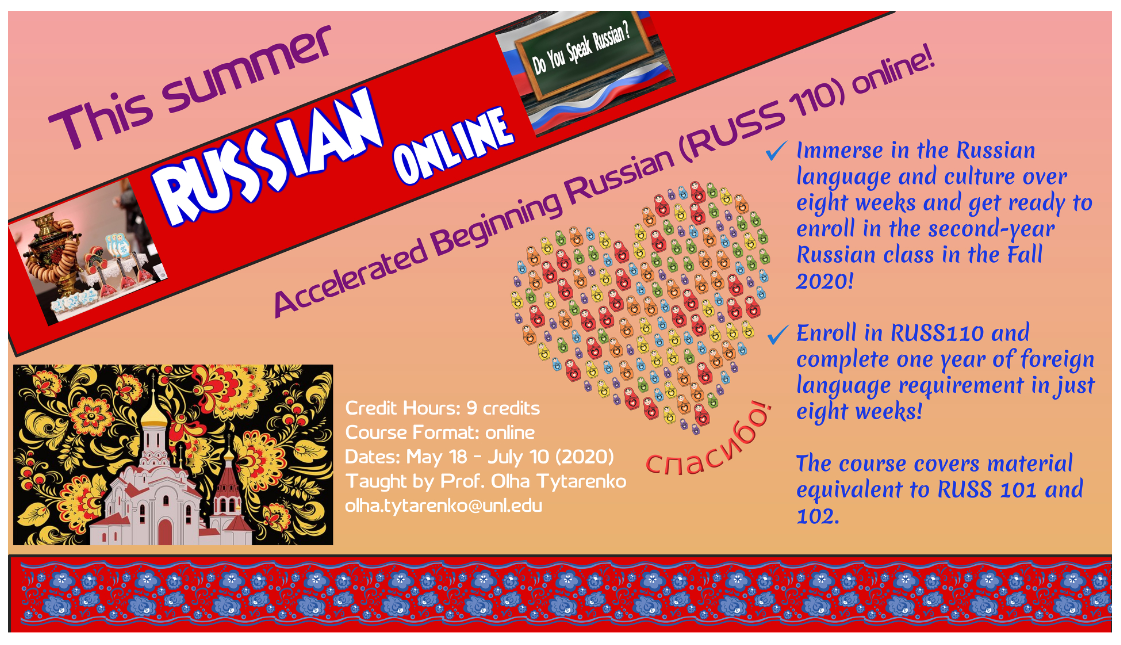
All UNL students can now complete their first year of language requirement online this summer. This online 9-credit course of Accelerated Beginning Russian (RUSS110) will let students complete the first year of Russian that is easily followed by a second year on campus. This means that students can complete their two year language requirement in three semesters. This innovate online course features Interactive classes, tutorials, fun and creative projects, games, lots of speaking practice, and much more. Moreover, this eight week (from May 18 to July 10) course is designed to introduce students to the richness of Russian language and culture. The class will also help students obtain a working knowledge of Russian, a language spoken by around 260 million people around the world. In addition to learning about incredible history of Russia and the region around it, anyone considering work in diplomacy, foreign service, federal government or business will find Russian a useful skill on the job market. Russian opens doors, and this summer students get a chance to distinguish themselves from their peers and create their own unique resume.
By the end of this course, students will feel comfortable writing and typing in Russian, be able to engage in simple conversation on a number of topics, keep a simple journal, and acquire some essential reading skills.
Be ready to fall in love with the Russian language and culture and get prepared to enter the second year of Russian language in the Fall. Complete language requirement in just one year after RUSS110! Have questions? Reach out to Olha Tytarenko at olha.tytarenko@unl.edu to chat about it.
Learn all about Russian Club on campus and how you can connect your language study with fun activities: facebook.com/unlrussianclub/
Finally here are top 10 reasons why students should study Russian:
1.)Russian is spoken by around 260 million people in Russia and surrounding countries.
2.) The US Government needs more Russian-language specialists: Federal agencies have identified Russian as a priority language of national need. Among the agencies that seek expertise in Russian: the U.S. Department of Agriculture (USDA), Department of Commerce, Department of Defense, Department of Energy, Health and Human Services, Homeland Security, Housing and Human Development, Department of Labor, and Department of the Interior. The FCC, ITC, FBI, CIA, NSA and State Department have also identified Russian as a priority language. These agencies are hiring, and need your Russian-language skills!
3.) The US Government needs more Russian-language specialists: Federal agencies have identified Russian as a priority language of national need. Among the agencies that seek expertise in Russian: the U.S. Department of Agriculture (USDA), Department of Commerce, Department of Defense, Department of Energy, Health and Human Services, Homeland Security, Housing and Human Development, Department of Labor, and Department of the Interior. The FCC, ITC, FBI, CIA, NSA and State Department have also identified Russian as a priority language. These agencies are hiring, and need your Russian-language skills!
4.) Russian is an important language for science and technology. According to a recent study, the number of publications in the sciences is highest for English, with Russian second. This is the case for chemistry, physics, geology, mathematics, and biological sciences. Russia always has had a rich tradition in the sciences, from Mendeleev to recent Fields medalists in mathematics. The Soviet tradition of creating scientific towns and scholarly communities is giving way to a system of entrepreneurship backed by state agencies and private-sector start-ups. Innovations in computer programming, software engineering, and information technology are coming out of Russian government agencies and private firms.
5.) You can use your Russian outside of Russia in following countries: Belarus, Ukraine, Uzbekistan, Kyrgyzstan, Kazakhstan, Tajikistan, Turkmenistan, Armenia, Azerbaijan, Georgia, Moldova, Latvia, Lithuania, Estonia and Israel.
6.) Russian is the largest country in the world and is home to 28 incredible UNESCO World Heritage Sites. From the Kremlin and Lake Baikal to the Golden Mountains of Altai — there is immense cultural and ecological wealth to be found in Russia.
7.) Russia has some of the lowest rates of English proficiency around. Only about 5% of Russians have a command of English, and in the majority of Russian cities, you’ll find almost no signs written in the Latin alphabet. Not exactly a tourist’s dream. So if you want to conquer the lands of the old Russian Empire, you can’t get around without at least a basic knowledge of Russian. It’s definitely worth tackling the Cyrillic alphabet and learning some phrases in order to connect with the locals on your trip!
8.) Russian Is A Language Of The Future
The fact is, Russian is far less popular as a second language than, for example, Mandarin — another language even more difficult for English speakers to grasp. This low popularity is a shame because there are a number of economic opportunities currently arising in Russia, Eastern Europe and Central Asia. And guess what: To get in on the act there, you have to speak Russian!
9.) Learn about one of the world's most fascinating cultures: Russia is home to some of the world's finest traditions in the arts. Ballet, theater, cinema, literature,music, and visual arts are only a few of the areas in which Russians have established great traditions and continue to produce remarkable innovators. From George Balanchine to Mikhail Baryshnikov, Sergei Eisenstein to Andrei Tarkovsky, Anton Chekhov to Constantine Stanislavsky, Fyodor Dostoevsky to Vladimir Sorokin, Shostakovich to Khvorostovsky… Russians produce great art!And did you know that knowing Russian helps you to see the world differently? Russian speakers, who have more words for light and dark blues, are better able to visually discriminate shades of blue.